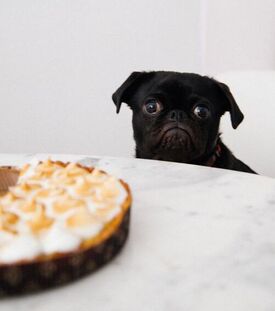Laurie Anne Walden, DVM  It’s tempting to share some of the Thanksgiving feast with our pets. Not all human food is safe for dogs and cats, though. The best way to avoid a holiday trip to the emergency clinic is to give pets their usual food and keep table food out of their reach. If you (or your guests) do want to give your pets a little bit of holiday food, though, here are some suggestions that are fine for most dogs and cats. Keep in mind a few rules of thumb. Don’t give them anything that’s dangerous to dogs and cats: fatty food, bones, raw meat, raw eggs, raisins, grapes, currants, onions, garlic, leeks, raw yeast dough, macadamia nuts, chocolate, and the sugar substitute xylitol. For more, see the posts on Thanksgiving safety for pets and human foods that are toxic to pets. Unseasoned single-ingredient foods are safer than multiple-ingredient dishes because they’re less likely to contain hidden dangers like onion. Moderation is key; too much of any food can upset a pet’s stomach. And remember that these suggestions don’t apply to pets with food allergies or digestive problems. Turkey breast A bite of cooked skinless, boneless turkey meat is safe for most dogs and cats. Keep portion size in mind; a 10-lb dog or cat does not need the same amount of turkey that a person would eat. Take these precautions:
Defatted turkey or chicken broth Pan drippings and gravy are too high in fat for dogs and cats. But a spoonful or two of defatted broth is usually fine for dogs. Don’t give broth to your cat unless you can be absolutely sure it wasn’t made with onions, leeks, shallots, or garlic; try tuna juice instead. Vegetables and fruits Dogs like vegetables more than you might think. Avoid grapes, raisins, currants, veggies cooked with fat or butter, and vegetable casseroles (that green bean casserole with the crispy onions on top? no). Stick with plain veggies and fruits, either raw or cooked without seasoning. My own dogs highly recommend all of these:
Bread A small piece of bread, cornbread, or biscuit is generally safe for dogs and cats. Keep unbaked dough out of their reach; raw yeast dough can cause ethanol poisoning. Watch for added fats and seasonings (no onion focaccia or garlic bread). A bite of plain bread is safer than dressing or stuffing, which is likely to contain fat, onion, and possibly raisins or currants. Also avoid store-bought baked goods that might contain artificial sweeteners like xylitol. For pets eating prescription or limited-ingredient diets The best approach for pets with medical needs or food allergies is to close them in a room away from the kitchen and dining area. Guests might not realize that these pets have dietary restrictions. If your pet is eating a special diet and you’d like to give treats, ask your veterinarian for safe options. Some prescription diet manufacturers have developed treats that are compatible with their diets. Photo by Charles 🇵🇭 Comments are closed.
|
AuthorLaurie Anne Walden, DVM Categories
All
Archives
June 2024
The contents of this blog are for information only and should not substitute for advice from a veterinarian who has examined the animal. All blog content is copyrighted by Mallard Creek Animal Hospital and may not be copied, reproduced, transmitted, or distributed without permission.
|
- Home
- About
- Our Services
- Our Team
-
Client Education Center
- AKC: Spaying and Neutering your Puppy
- Animal Poison Control
- ASPCA Poisonous Plants
- AVMA: Spaying and Neutering your pet
- Biting Puppies
- Boarding Your Dog
- Caring for the Senior Cat
- Cats and Claws
- FDA warning - Bone treats
- Force Free Alliance of Charlotte Trainers
- Getting your Cat to the Vet - AAFP
- Holiday Hazards
- How To Feed Cats for Good Health
- How to Get the Most Out of your Annual Exam
- Indoor Cat Initiative - OSU
- Introducing Your Dog to Your Baby
- Moving Your Cat to a New Home
- Muzzle Training
- Osteoarthritis Checklist for Cats
- What To Do When You Find a Stray
- Our Online Store
- Dr. Walden's Blog
- Client Center
- Contact
- Cat Enrichment Month 2024
|
Office Hours
Monday through Friday 7:30 am to 6:00 pm
|
Mallard Creek Animal Hospital
2110 Ben Craig Dr. Suite 100
|
Site powered by Weebly. Managed by IDEXX Laboratories

 RSS Feed
RSS Feed